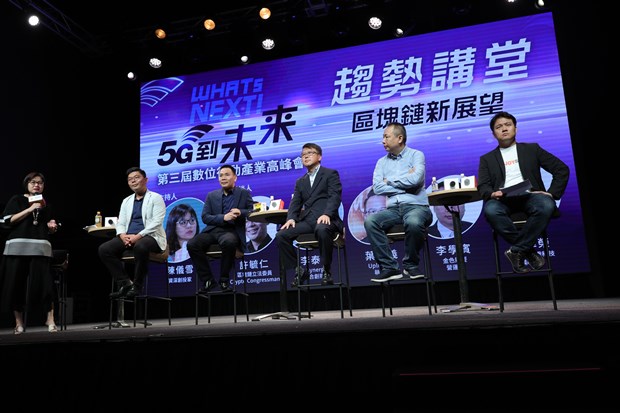The Truth Behind ICO Roadshows
Red Blockchain Rolling in Taiwan

Source:Ming-Tang Huang
Chinese crypto media, capital and social communities are joining hands, moving their speculative frameworks to Taiwan after being purged from China. If they reenact their pump and dump schemes in Taiwan, taking the money and running, investors could lose their shirts, and the future of Taiwan’s blockchain industry could be thrown into jeopardy.
Views
Red Blockchain Rolling in Taiwan
By Chuo-han Yangweb only
China has recently intensified its crackdown on initial coin offerings (ICO) (startups raising money by offering crypto coins or virtual tokens to interested investors instead of going public in the regulated stock market). In mid-August, China closed the WeChat accounts of eight major Chinese crypto-focused media outlets. WeChat Pay and AliPay have also banned virtual currency transactions. On August 23 and August 29, respectively, Beijing and Guangzhou announced a ban on virtual currency-related promotional events.
Pan Gongsheng, deputy governor of the People’s Bank of China, also declared publicly that all stock markets in China would “nip in the bud” all virtual currency exchanges and ICO activities.
Taiwan the New El Dorado for Chinese Crypto Scams
“Given that China has strictly banned the online and offline promotion of ICOs, these people have nowhere to go. Now they want to move their entire currency manipulation schemes to Taiwan,” observes Sun Tzu-hsuan, Taiwan community manager with OKEx, the world’s third-largest cryptocurrency exchange in terms of volume. Chinese media and Chinese capital form a giant complex of vested interests that is currently staging schemes in Taiwan.
Showing up first were Chinese media outlets. Li Xuebin, COO of Golden Finance, one of the crypto-related social media whose WeChat accounts were shuttered, made an appearance at the third Whats Next! 5G digital and mobile industry summit on August 28, an event held under the auspices of the National Development Council.

Li told the audience and attending Taiwanese government officials: “Golden Finance can give guidance to the market by providing many more correct ideas and helping cryptocurrency investors understand investment risks and find investment opportunities.” Other participants took advantage of the 5G Summit to advertise Chinese blockchain projects on stage.
Publicity is an essential element in ICOs because their fundraising targets the general public. Without the hype from publicity campaigns and media coverage, small investors will not buy into the crypto trend. That’s why Taipei’s hippest hotels such as the W Hotel host roadshows for Chinese ICO virtually every week.
When asked whether he came to Taiwan because of the Chinese ban, Li avoided a clear-cut answer, saying “I’m not in a position to answer that question.”
Chinese Media Already Here
Meanwhile Chinese media are directly expanding their presence in Taiwan.
Block Times, a crypto news online media outlet formally launched on August 26, has its office in the Giraffe Cultural Enterprises headquarters building near Shandao Temple in Taipei. The Chinese-only website uses traditional Chinese characters and claims to be “Taiwan’s most influential blockchain media outlet.”
Behind Block Times is the well-known Chinese blockchain social media portal Block360.Pro. Two Chinese nationals work at their Taiwanese office, one being Block Finance founder Elaine Shi and the other Block Times Taiwan representative Guo Pan, who has been busy lately touring Taiwan’s tech media and visiting officials and blockchain teams
When asked if Chinese media entering Taiwan creates problems due to the possible involvement of Chinese capital, Shi says, “The Block Times in Taiwan is completely Taiwanese-funded; there is no money whatsoever from China. There is no Chinese funding problem.”
The Block Times’ first action in Taiwan was to interview Jason Hsu, a Kuomintang lawmaker who is internationally known as the “crypto congressman.“ While Hsu agreed to the interview, he says that he maintains a cautious attitude with regard to the Chinese media presence in Taiwan.
“China blocked the cryptocurrency media because some hyped blockchain projects by presenting them in a very good light, although they were actually selling tokens, taking the money and running. As a legislator, I will actively observe the situation to see whether there is suspicion of false advertising to protect Taiwan’s consumers and investors.”
Chinese Money is Here Too
Not only has the Chinese media come to Taiwan; Chinese currency speculators are also expanding their turf to include Taiwan.
The Manzi Fund, part of the business empire of famous American-Chinese entrepreneur and angel investor Charles Xue (a.k.a. Xue Manzi), manages assets worth 500 million renminbi. The fund noted on a Chinese human resources website on August 16 that it had registered a limited liability company in Taipei engaged in “stock investment, asset management, investment management and investment consulting services.”
The Block Times also helped recruit an operations manager who is in charge of expanding Taiwan sales and who will receive a coin gift in Ether upon assuming the position. Shi, however, points out that the Block Times and the Manzi Fund do not have a cooperative relationship.
On September 6, the Manzi Fund and other capital and exchanges from China convened a “Blockchain and Cryptocurrency Forum” at the Grand Hotel in Taipei together with the Block Times and other media, including Golden Finance. They hired Taiwanese celebrity and variety show host Jacky Wu as emcee.
Among the publicized 23 VIPs attending the event were only two Taiwanese people: Wu and the author of a book on how to get rich quick with virtual currencies. The 111 cooperating media outlets were without exception all crypto-related media from China.
A Replay of Pump and Dump Schemes in Taiwan?
Now that Chinese cryptocurrency promoters have come to Taiwan after hitting the wall in China, the greatest concern is that they will bring with them the pump and dump schemes they used to rip off small investors in China. Joey Luo, founder of Taiwanese cryptocurrency news site BlockTempo explains how these pyramid schemes work.
Technology owners first obtain virtual currency free of charge during presales when the ICO takes shape. In the “capital round”, capital management companies with money to spend, such as venture capital firms, get involved, buying coins at a heavily discounted price of just 1 percent of the cost. Media and capital management companies then collaborate, staging events and advertising the ICO project. When the "private equity round" comes around, WeChat and other social media are used to sell coins to investment representatives and private equity investors. At this point, the capital management companies pull out of the market, reaping a tenfold return on their investment.
When the "crowdfunding stage" comes, small individual investors join the project. The large investors who bought during the private equity round begin to dump their coins, which causes the price of the currency to plummet. One such example is the ICO of BitBitDuo (BBD), which was promoted in Taiwan. Before BBD was publicly traded, various cross-strait media hyped the project, attracting many Taiwanese investors. According to a BitBitDuo press release, BBD transactions reached NT$4 billion on the first day of trading.
But on August 25, when BBD traded against the mainstream cryptocurrency USDT for the first time, it slipped from an opening price of US$0.021 to US$0.0058. By the fourth day it had fallen to US$0.00009, meaning it had lost 99.57 percent in four days, retaining only 0.43 percent of its issue price. Market insiders estimate that this price is the equivalent of the cost price in the venture capital round, since all investors who bought into the BBD after that were ripped off.
On its official website, BitBitDuo declared in a statement that “price fluctuations fall under the normal phenomena of healthy transactions.”
Chinese-funded Media Not Allowed in Taiwan
Chang Min-pin, director-general of the Department of Investment Services under the Ministry of Economic Affairs, says that the department has presently not received any investment applications related to China and blockchain. Industry insiders say this is entirely normal, since such capital flows are not conducted in national currencies such as the New Taiwan dollar or renminbi but rather in bitcoin (BTC) or ether (ETH).
Crypto and blockchain media typically get a payment of one bitcoin for each posting of an article that advertises cryptocurrencies and tokens. In peak times, this can be the equivalent of NT$200,000 to NT$300,000. Such payments constitute the major source of income for most crypto and blockchain media.
Blocktempo’s Luo is worried that, “due to the Chinese government crackdown, this ICO model is now moving to Taiwan and other Southeast Asian countries, which could deal a massive blow to the local blockchain ecosystem.” Noting that “Taiwan’s blockchain industry presently still has a good reputation in the international community,” Luo warns that if Chinese projects come to Taiwan to dupe people, resulting in ICOs being equated with fraud and pyramid schemes, then Taiwan’s reputation will be destroyed, and Taiwan’s own blockchain teams will go under.
In response to concerns over the massive influx of Chinese media into Taiwan, Shi says: “Industry development follows a process from chaos to regular order. The Block Times will first discipline itself and get its act together, and then let the industry develop in a more regular and rational manner.”
Lawmaker Hsu also bemoans the speculative atmosphere. “There is too much (Chinese) money flooding in too quickly; no one is interested in the technology, or whether the teams keep their pledges after an ICO; everyone only cares about playing the market and getting out as soon as they have made a profit.”
He believes that China will implement even tighter controls over the crypto and blockchain industries and clean up the market with even greater resolve. Luo suggests that the Financial Supervisory Commission (SFC) and the Ministry of Justice should regulate virtual currencies to make sure that Taiwan’s blockchain industry is not destroyed amid Chinese crypto speculation.
Translated from the Chinese Article by Susanne Ganz
Edited by Shawn Chou
Additional Reading
♦ Cracking the Code of Blockchain
♦ Why are So Few Women Buying into Bitcoin?
♦ Enticing Taiwan with Culture







